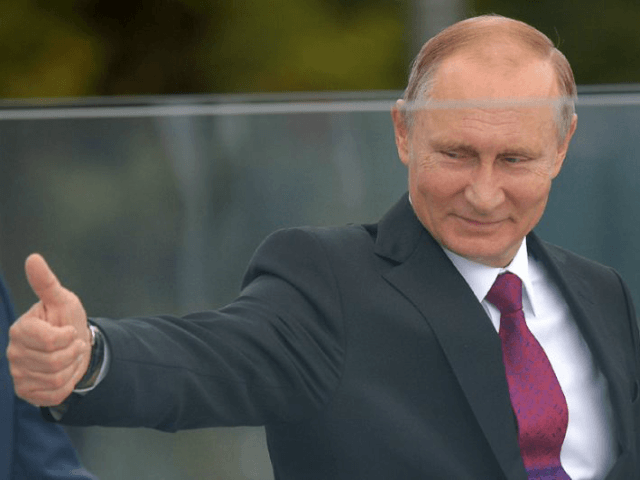The Russian government confirmed Thursday that President Vladimir Putin will visit Iran “before the end of this year” for a “trilateral Iran-Russia-Azerbaijan meeting.”
The announcement comes on the eve of American President Donald Trump potentially refusing to certify that Iran is in compliance with the 2015 nuclear deal, a move Kremlin spokesman Dmitry Peskov has warned would bring “negative consequences” without elaborating.
The Russian news agency TASS reported that presidential aide Yuri Ushakov confirmed Putin’s visit to reporters, refusing to provide a date for the visit or details of the topics Putin is expected to discuss with Iranian and Azerbaijani officials. TASS notes, however, that the previous meeting of the leaders of the three nations included discussions on “joined economic projects and regional security issues.”
Iran’s state-run PressTV reported that Tehran expects Putin to visit the nation in November “to discuss issues of bilateral interest with his Iranian counterpart,” Hassan Rouhani, in addition to attending the meeting with the Azerbaijani leader.
Putin most recently met Rouhani in March, when the Iranian president visited Moscow. During that meeting, the heads of both nations signed multiple economic deals, most involving cooperation in energy, which a joint statement asserted was a topic provided “special attention.” At the time, Putin noted that Iranian-Russian business ties had grown “more than 70 percent” in 2016.
While reports have suggested that Putin does not personally get along “that great” with Rouhani, their governments have striven to deepen the ties binding each other. While Rouhani is president, he is subject to the power of the nation’s Supreme Leader, Ayatollah Khamenei, and thus Putin would only have to work with Rouhani so long as Khamenei approves of his remaining in power.
In addition to their economic ties, Russia and Iran are both the primary patrons of Syrian dictator Bashar al-Assad, and both Russian and Iranian military assets have contributed to keeping him in power against rebel militias. Russia insists its presence in Syria is necessary for combatting the Islamic State. Russia, Iran, and the Assad regime have implemented a “de-escalation” plan in Syria that experts have widely deemed a failure due in part to its exclusion of the major parties fighting in that civil war, particularly the Islamic State and the Kurdish People’s Protection Unit militia (YPG/YPJ). Iran and Russia have cooperated in establishing these talks with Kazakhstan—thus the branding of them as “Astana” talks—and with Turkey, whose government supports the ouster of Assad.
Russia is also a signatory to the Joint Comprehensive Plan of Action (JCPoA), the 2015 Iranian nuclear deal. Russian officials insist that Iran has not violated the deal, despite multiple reports revealing evidence to the contrary, and have warned that a U.S. exit from the deal could have “negative consequences.”
Peskov, the Kremlin spokesman who used that phrase this week, refused to elaborate, adding that “we can only try to predict the nature of these consequences, which we are doing now.”
A robust Iran benefits Russia, which needs as many buyers as it can find for its technology. As Forbes explained a year ago, “Iran has a budget of US$ 40 billion for modernising its army and hence, Russia could find this market lucrative.” Russia has sold an air defense system to Iran as well as offered to negotiate a larger nuclear power agreement that would provide Iran with technology to fuel its power plants and Russia which a much-needed cash influx.
Russia has insisted that Iran has not violated the JCPOA, leading U.S. Ambassador to the United Nations Nikki Haley to apparently accuse Moscow this month of helping prevent proper inspection of Iranian nuclear sites by the International Atomic Energy Agency (IAEA). While Haley did not name Russia, she referred to “some countries … attempting to shield Iran from even more inspections. Without inspections, the Iran deal is an empty promise.”

COMMENTS
Please let us know if you're having issues with commenting.